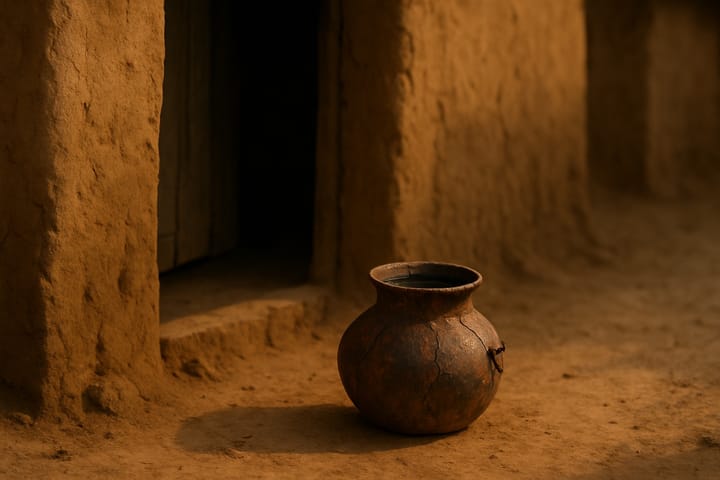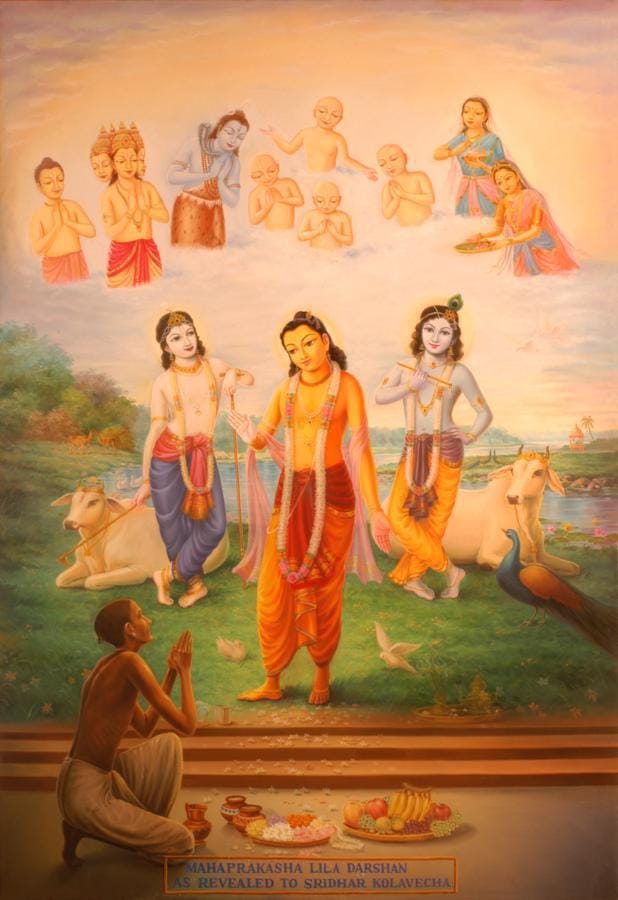Ekādaśī and the Gauḍīya Hospital

Starting today, I will try to regularly write something to post the day before Ekādaśī. I got the idea to do this yesterday and only late last night did I write the article below. Although it should still be a rough draft😅, I'm posting it now so it doesn't go out too late.
Before I begin, I'd like to share a little annoucement with you:
On my Facebook page and YouTube channel, I will go live to recite the verses of Bhagavad-gītā along my Śrīla Gurudeva's translations of them. I'm dividing the recitations into three parts because I think it might become overwhelming to do it all in one go. Here are the timings:
3 Dec — 7:00 PM India time (5:30 AM Pacific time)
CHAPTERS 1–6 ❧ Karma-yoga
4 Dec — 7:00 AM India time (5:30 PM Pacific time)
CHAPTERS 7–12 ❧ Bhakti-yoga
4 Dec — 7:00 PM India time (5:30 AM Pacific time)
CHAPTERS 13–18 ❧ Jñāna-yoga
If you'd like to receive a notification and link the YouTube stream when I begin, you can join our "Daily Bhagavatam" WhatsApp group. I will share my screen so you can easily recite the verses with me.
Bhakti-jananī Śrī Ekādaśī
I’ve fallen deep into tamo-guṇa. I've been waking up late. I don't try to focus while I chant my rounds or do my ahnik. I let hours waste away with movies or YouTube videos. While my friends are listening to kirtan and classes, I’m listening to mundane audiobooks and different types of music. Although I'm in Vrindavan, it's been a long time since I've had darśana of any Ṭhākurajī or sang a kīrtana. I live like a little prince, enjoying the facilities of my Gurudeva's property... I could go on much longer.
To be clear, I’m not trying to make a confession here. Giving so much weight to my anarthas will just cause me to wallow in self-pity; but, at the same time, ignoring them isn't good either.
The mother of bhakti (bhakti-jananī), Śrīmatī Ekādaśī-devī, is coming tomorrow. When she arrives, she'll give me a chance to deeply assess my current situation and make adjustments. I can then make a saṅkalpa, and she'll give extra strength for that saṅkalpa to be successful. If I slip, no worries, I can stand back up and keep trying; soon enough, she'll return to help me readjust and start afresh.
The Gauḍīya Hospital
In all the verses of Manaḥ-śikṣā, Śrīla Raghunātha dāsa Gosvāmī shows us how we are separate from our mind and anarthas. Sure, I'm stuck with them in this current body, but they don't make up who I am. Identifying with my mind and anarthas is like identifying with a sickness: "I am my fever!".. I need to chill out, take a look at my symptoms, follow the doctor's prescription, and my fever will gradually diminish. Therefore, I shouldn’t be too harsh on myself. And I definitely shouldn’t be harsh on others, regarding whatever diseases they may have.
Imagine if a sick man went to the hospital and started pointing his finger at the other patients, ridiculing them and judging them, based on their particular diseases. “Look at that mute! What was that? Ohhh... too dumb to talk? Bahaha.”
We each have a unique set of diseases that we’ve been carrying across many lifetimes. I may not have a particular disease you have, but I surely have my fair share of other unique diseases! Just like all the other patients, I came to the Gauḍīya Hospital to get better myself. I'm not here to focus on the diseases of others. The doctors and nurses are there to take care of that. My concern is my own condition and to follow my doctors' prescriptions.
We will each have our own particular doctor(s) or nurse(s). Some patients are getting treated by the most expert doctors who have successfully treated thousands of the most severe cases. Others are getting some initial treatments from a nurse until the expert doctor steps in and takes over. Some are still sitting in the waiting room, waiting to be assigned to a particular doctor.
The amazing thing about this Gauḍīya Hospital is that it is completely free and takes complete responsibility, ensuring each patient 100% full recovery, no matter the enormity of the particular disease or condition. There is also no time limit for how long one can stay in the hospital. Yet I think it goes without saying that we need to do our part to follow the prescription given to us. There isn't much a doctor can do if I continually spit out the medicine he or she feeds me. Luckily for us, the doctors in this hospital are extremely kind, tolerant and forgiving, but I shouldn't make my doctor's job more difficult than it already is.
One thing to be wary of is the fraudsters who sneak into the hospital and dress up like doctors but are really there just to steal your money. Or sometimes, unfortunately, there are people way too confident in their ability to be a doctor – so be extra vigilant.
No matter what though, there is never a reason to give up hope, even if we fell for one of the frauds, because that hospital guarantee forever holds strong.
Your doctor will examine you and give the proper diagnosis, medicine, diet, and exercise. The term for following that procedure is "sādhana". We'll get better to the extent we follow the sādhana given to us.
As I mentioned before, Ekādaśī is the day for getting a special check up, an examination: What are the symptoms like now? What adjustments need to be made to the diet, etc?
It isn’t always easy taking the medicine. Like Śrīla Rūpa Gosvāmī writes in Upadeśāmṛta (verse 7), the medicine of sugar-candy, though sweet, tastes bitter to one afflicted with jaundice. The wonder drug of this Gauḍīya Hospital, the secret panacea, is harināma. It cures all diseases and gives all strength. It's not just medicine though, it is unlimitedly flavorful, life-giving ambrosia, which is completely non-different from Śrī Hari Himself. Although the sweetness of harināma is beyond comparison and description, I find it tasteless and boring because of the extremity of my condition.
Encouragement among friends
It's important to have good friends that genuinely care about my wellbeing and encourage me to stick with the treatment and medicine I've been given, even though I may be trying to avoid it. I can also try to encourage a struggling friend. But if I'm not trying to take my own medicine, I might end up getting him more sick and spreading my own diseases. We should try as much as possible to be good association for our peers and juniors.
A couple weeks ago, I made a pact with one of my friends to help keep each other accountable with sādhana-related goals. One thing I noticed that was badly affecting my "sādhana" was my habit of going to sleep at around 1AM every day. So, each night, I sent him a WhatsApp message, reporting the time I was going to bed. I started with the aim of laying down before 10:30, yet it’s ended up being around 11:30 most nights. Anyhow, still a big improvement from 1AM! Maybe from this Ekādaśī onwards, I’ll make it 11 as I slowly progress toward my ideal bedtime of 9:30. This Ekādaśī, I might start adding other things in my daily report to him, like if I did kirtan or I completed my harinama. I'll have to think about it.
At the end of his day (on the other side of the world), he sends me a screenshot of his screen usage stats (using the Screen Time feature on iOS) along with his analysis.
If you struggle with self-discipline like me, maybe you can also find a friend who you can report to at the end of each day with whatever good habit you want to cultivate or bad habit you want to get rid of. I suggest choosing something super simple. If you aren’t able to stick with what you chose for more than a few days, that’s totally fine. It just means you need to set the bar a little lower. Don’t worry how low the bar is set, because you'll keep raising it over time. For example, if you want to read a devotional book, commit yourself to reading at least one page (or even a paragraph) before going to sleep at night. You can let your friend know every day how much you’ve read.
If you start doing this with someone, I'd love to hear how it goes. You can write here in the comments or share your progress in the comments of my next pre-Ekādaśī posting.
Ultimately, śrī guru is the one who truly helps us. He is our only real friend. We can only make progress by his mercy. We can seemingly be doing everything right externally, yet if we are not praying and trying to cultivate a mood of submissive service to him, then, regardless of our attempts, we won't be able to move a single inch.



Comments ()